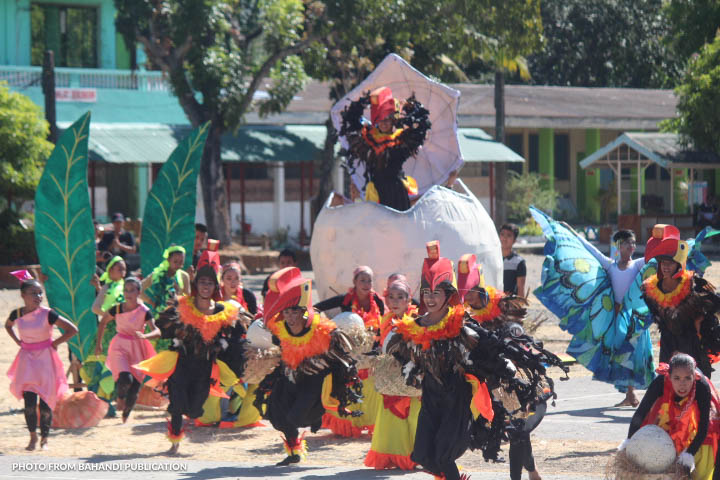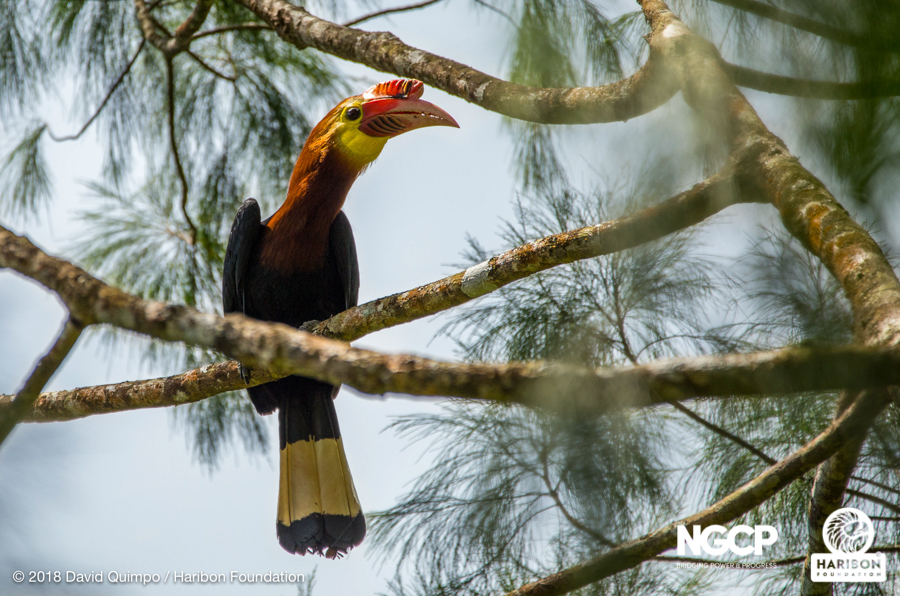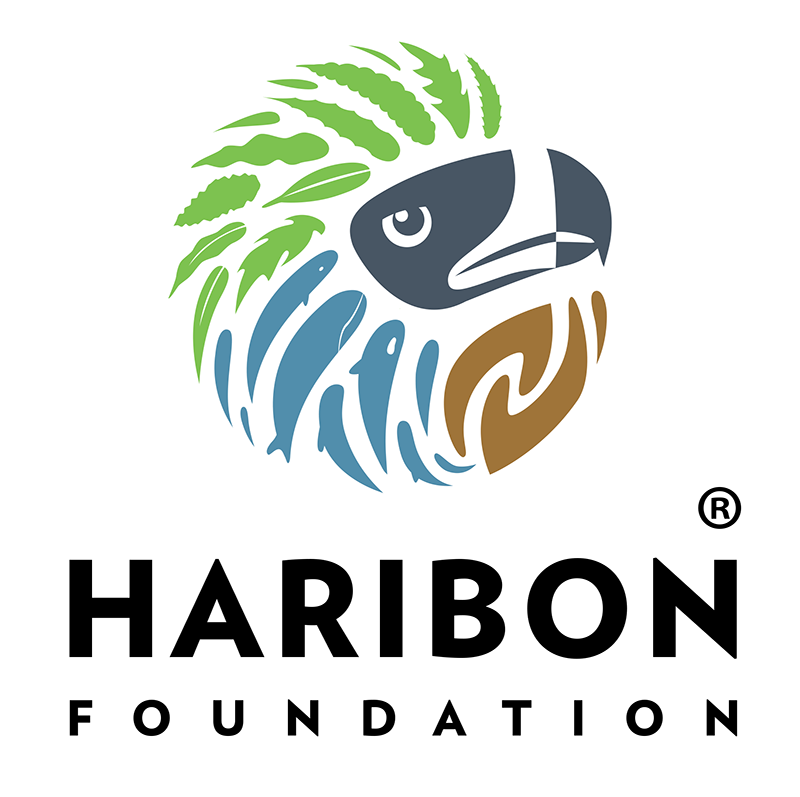One of the most threatened hornbills in the world has been “downlisted” or lowered to a less threatened category under the IUCN Red List.
The announcement comes as the Haribon Foundation reaches 25 years in working with people to conserve the Dulungan hornbill, as well as its 53rd year in biodiversity conservation.
The downlisting also coincides with the end of the IUCN World Congress last early October. The IUCN, or the International Union for Conservation of Nature, updated this Red List which tracks species at risk of extinction worldwide.
The Dulungan hornbill (Rhabdotorrhinus waldeni), also known as the Rufous-headed Hornbill or Walden’s hornbill, has long been categorized as Critically Endangered on the Red List since 1994. After more than 30 years of being designated Critically Endangered, the Dulungan was downlisted to Endangered due to a slower rate of decline of the species, as cited by the BirdLife Red List team. It is still Critically Endangered in the Philippine Red List.
The downlisting comes as a surprise for communities and organizations familiar with the threats to the Dulungan in Panay. David Quimpo, head of the Conservation Research Department at Haribon, shared that “careful considerations” must be made in a BirdLife Red List forum on the Dulungan.
The Dulungan was once found on the islands of Guimaras and Negros, but is now deemed “possibly extinct” by the IUCN in these areas. They can only be found today in the forests of the Central Panay Mountain Range or CPMR. The range is considered the “last stronghold” of the species. Forest watersheds of the CPMR is shared by all 4 provinces in Panay: Aklan, Antique, Capiz, and Iloilo.
Since 2000, tree cover in the Dulungan’s range has reduced by 7-8%. Panay’s forests remain highly threatened by future development including renewable energy infrastructure, dams, and roads. Pet trade was not initially considered a threat to the Dulungan, but in 2024 Dulungan were found in Indonesia, and three birds were offered for sale in Hungary.
Other threats to the Dulungan include hunting, illegal logging, and a variety of planned construction projects in the Central Panay Mountain Range.
“With the current threats faced by the species in Panay Island, which is the only island where the species is considered as functionally breeding… downlisting may give an impression that the species is now doing okay, which is not true due to the new arising threats across its range,” shared David.
In a response to similar comments by fellow biologists and peers, the BirdLife Red List team shared that since the decline of the Dulungan hornbill was not more than 80% for three generations or in 25 years since 2000, it did not reach “the appropriate thresholds” for a Critically Endangered listing.
Although the Dulungan Hornbill has been downlisted from Critically Endangered to Endangered, its survival remains precarious. The apparent slowing of its population decline may be partly because nearly all remaining individuals are now confined to a single refuge - the Central Panay Mountain Range, the species’ last stronghold. With an estimated 3,000 mature individuals left, the Dulungan has already vanished from other parts of its former range, such as Negros and Guimaras. While local communities continue to protect some of the remaining forests in Central Panay, ongoing threats - including road construction and even certain renewable energy developments - could irreversibly destroy its habitat. For a population this small, even minor disturbances could have devastating, lasting effects.
Another factor that has contributed to the slower rate of decline, and the prevention of the Dulugan’s extinction in Panay, is the sustained conservation work carried out on the island since the early 2000s.
Organizations such as Haribon Foundation, the Philippine Biodiversity Conservation Foundation (PhilBio), the Philippine Initiative for Conservation of Environment and the People (PhilinCon), along with the Provincial Government of Antique and local government units, have long been working to protect the Dulungan and its remaining habitat.
Haribon’s efforts over the past 25 years, through initiatives such as the Integrating Forest Conservation with Local Governance in the Philippines (IFCLGP) project, Forests and Climate Protection Project (ForClim), Species of Hope: Dulungan, and other collaborations with BirdLife International and Zoological Society of London, have helped strengthen local forest protection and raise awareness for the species’ conservation. These long-term interventions have played a crucial role in slowing the Dulungan’s decline, and are a testament to the impact of continued cooperation among communities, conservationists, and local authorities.

The next step is to level up support for communities and LGUs working on conserving forests in Panay. Through Haribon’s AGOS and CPMR projects we are working on the conservation of the Aklan River Watershed Forest Reserve and the Central Panay Mountain Range. If we can help declare the CPMR as a Protected Area we can further ensure the survival of the Dulungan, and the forest resources it shares with the people of Panay - including the Indigenous communities of the Panay Bukidnon.
As Haribon celebrates its 53rd year in biodiversity conservation, we celebrate the fact that together we have prevented extinction. However only together can we “downlist” the Dulungan and our shared forests from any or all Red Lists, and back to green. The work must continue, and with everyone’s support.
Since the update, the IUCN Red List now consists of 172,620 species - of which 48,646 of them are threatened with extinction.
The update includes changes to assessments of 1,360 bird species after a review of all bird species known worldwide by BirdLife International. This involves thousands of experts from all over the world, including those from Haribon, PhilBio, PhilinCon, the DENR, and others, over the course of nine years.
It has also found that deforestation drives global bird declines. 61% of bird species have declining populations including the Dulungan. This estimate of bird species being lost to the world has increased from 44% in 2016.
Help bring back the Dulungan. Become a Haribon member, adopt a seedling, or learn more at haribon.org.ph, or follow Haribon on Facebook, Instagram, or LinkedIn at @goharibon.
References and further reading
BirdLife Globally Threatened Bird Forum, 2025 - Rufous-headed Hornbill (Rhabdotorrhinus waldeni) https://forums.birdlife.org/2025-2-rufous-headed-hornbill-rhabdotorrhinus-waldeni/
National List of Threatened Terrestrial Fauna of the Philippines as per DENR Administrative Order (DAO) 2019-09 https://bmb.gov.ph/downloads/WRD/WC/WC2020/stat_and_lists_of_wildlife/fauna/dao-2019-09.pdf
BirdLife Datazone - Rufous-headed Hornbill Rhabdotorrhinus waldeni https://datazone.birdlife.org/species/factsheet/rufous-headed-hornbill-rhabdotorrhinus-waldeni
IUCN. 2025 - Arctic seals threatened by climate change, birds decline globally - IUCN Red List, 10 Oct, 2025 https://iucn.org/press-release/202510/arctic-seals-threatened-climate-change-birds-decline-globally-iucn-red-list

